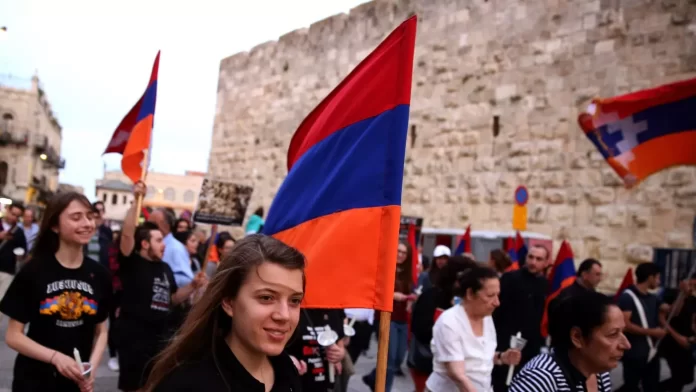21 Jun. 24: Armenia has formally recognised the state of Palestine, the Armenian foreign ministry said in a statement on Friday.
The ministry cited the “ca
tastrophic humanitarian situation in Gaza” among the reasons behind its decision, which was welcomed by the Palestinian Authority (PA) and Hamas, and prompted a rebuke from Israel.
Yerevan rejected violence against civilians and hostage-taking, the foreign ministry’s statement said, adding that it was committed to establishing “lasting reconciliation between the Jewish and Palestinian peoples”. The statement reaffirmed Armenia’s support for a “two-state” solution.
“Based on the foregoing and reaffirming our commitment to international law and the principles of equality, sovereignty, and peaceful coexistence of peoples, the Republic of Armenia recognises the State of Palestine,” the statement read.
The Ramallah-based PA, which has limited powers under Israeli occupation in the West Bank, hailed the recognition as “crucial for efforts aimed at establishing stability and peace in the Middle East by ending the illegal Israeli occupation and ensuring the Palestinian people’s right to self-determination”.
Hamas, the de facto ruling authority in the Gaza Strip, also welcomed the decision, calling it another “important step on the path to establishing international recognition of the Palestinian people’s rights and aspirations to end the Zionist-Nazi occupation and establish an independent, fully sovereign state with Jerusalem as its capital”.
The Israeli foreign ministry said it summoned the Armenian ambassador in Israel for a “severe reprimand”.
Armenia was among 121 countries to back a resolution at the UN General Assembly on 27 October calling for an immediate ceasefire in Gaza, where the Israeli war has now killed over 37,400 Palestinians and wounded 85,000 more.
In 2016, Serzh Sargsyan, Armenia’s president at the time, said he supported Palestine’s right to self-determination in an interview with Lebanese news channel Al Mayadeen TV. He added that he had never paid an official visit to Israel.
“Many things link us with the people of Palestine. I do not want to delve deep into the history, but we have a very positive attitude towards them,” he said.
Strong Armenian-Palestinian ties have a long history. The Armenian presence in Jerusalem dates back to the 4th century and is considered the oldest living diaspora community outside Armenia.
From 1915 onwards, when 1.5 million ethnic Armenians were massacred across the the Anatolian peninsula, the community swelled as thousands of victims fled and resettled in Jerusalem’s Armenian quarter.
But the population has declined amid Israeli persecution and economic instability. Currently, there are 4,500 Armenians living in Palestine, compared to 15,000 in 1948.
Armenia’s announcement follows a similar move from Spain, Ireland and Norway, which last month formally recognised the state of Palestine, joining over 140 UN member states that have recognised its statehood over the past four decades.
Spanish Prime Minister Pedro Sanchez called the recognition “a matter of historical justice”.
“The only route towards establishing peace is the establishment of a Palestinian state, living side-by-side with the state of Israel,” he said.
“The state of Palestine must be viable with the West Bank and Gaza connected by a corridor and with East Jerusalem as its capital.”
The recognitions elicited fury from Israeli politicians, prompting them to recall their ambassadors from all three countries.
Israeli Foreign Minister Israel Katz accused Spain’s Sanchez of being a “partner to incitement” of Jewish “genocide”.
The vast majority of countries in Asia, Africa and South America recognises a Palestinian state.
While growing numbers of EU member states are announcing recognition, only 11 out of 27 have made the move, including Bulgaria, Cyprus, Czechia, Hungary, Poland, Romania, Slovakia, and Sweden.
Notably, France, Belgium, Denmark, Estonia, Greece, Luxembourg, Portugal, Slovenia and Malta – EU members that don’t recognise Palestine – were among those to vote in favour of Palestine’s UN membership attempts on 10 May.
In recent weeks, Slovenia and Malta have indicated they plan to make the same move.
France continues to delay its decision, with President Emmanuel Macron saying that he is waiting for “a useful time” to make the move.
The EU’s position, which is also held by other western countries such as the US and UK, is that Palestinian statehood should only come as part of a negotiated settlement with Israel.




